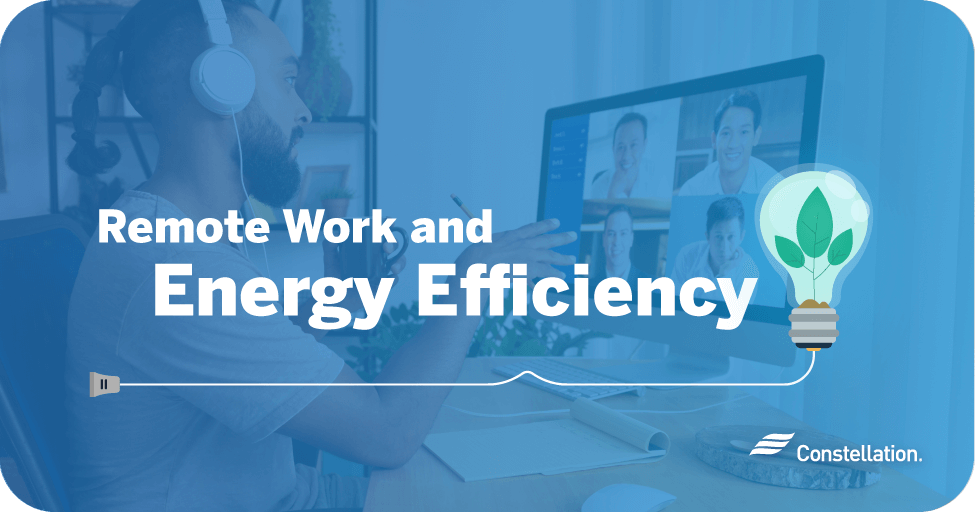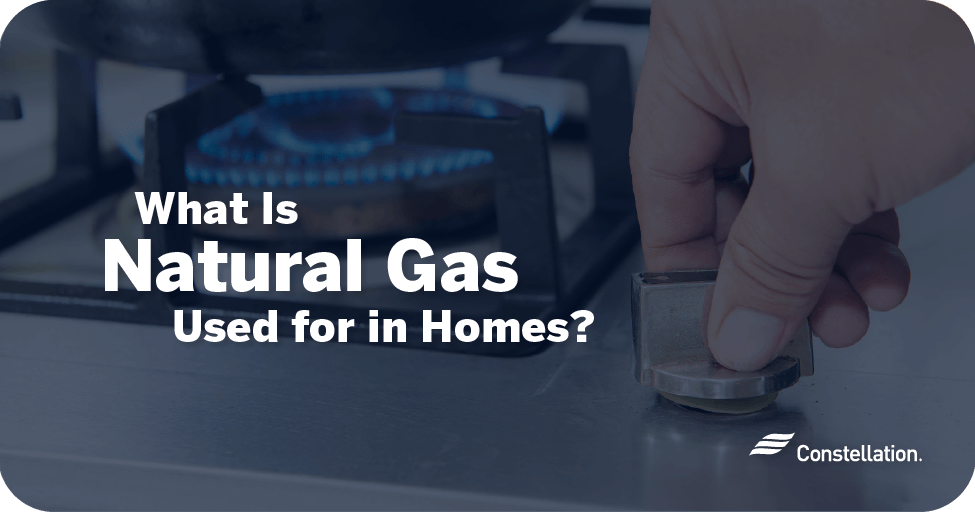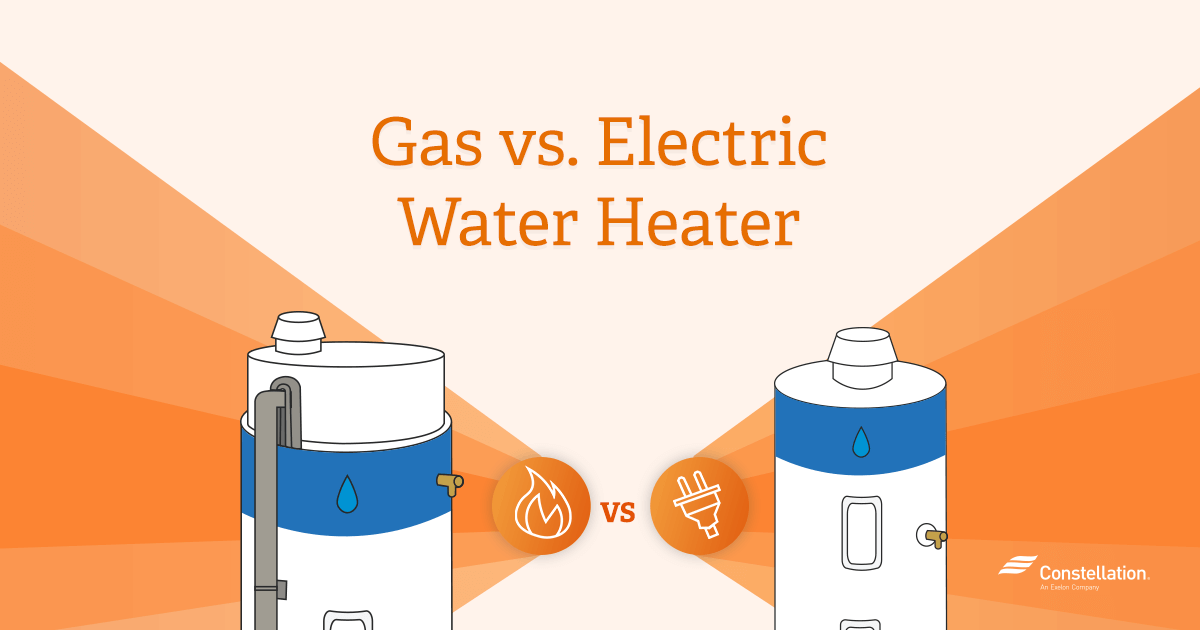
- Category:
Home Energy Savings - Published:
September 26, 2016 - Updated:
August 28, 2020
Gas vs. Electric Water Heaters: Which Is More Energy-Efficient?
Other than equipment costs, you might not have thought too much about selecting a water heater. But, to get hot-water heater energy savings, there are some factors to consider before you purchase. For example, what size water heater do you need? What types of hot-water heaters are there? And how should water heater energy use be factored into your decision-making?
Here, we’ll cover everything you need to know about gas vs. electric water heater cost, sizing and efficiency.
Understanding water heater energy usage
Most of us turn on the faucet and don’t pay much attention to how the hot water arrives — until, of course, it doesn’t. We tend to take the hot-water heater in our homes for granted.
But ignoring your hot-water heater might mean passing up an opportunity to gain some hot-water heater energy savings. Water heater energy usage makes up about 18% of the average utility bill, after all. You can find hot-water heater energy savings a few different ways. But knowing how to choose a hot-water heater that’s energy-efficient from the beginning is the best way to lower your energy costs from the first time that heater kicks on.
How to choose a hot-water heater
First, some basics for selecting a water heater. A single-family tank water heater has a reservoir of hot water ranging from 20 to 80 gallons. When someone turns on the hot-water faucet, the hot water is released from the top of the tank and piped to where it’s needed in the house. The hot water in the tank is replaced with cold water entering the bottom of the tank to ensure the tank is always full.
1. Determine the type of fuel source in your home.
The fuel source that powers your home can help you decide which type of hot-water heater to get. Although some homes are fitted for natural gas, 1 in 4 U.S. homes is all electric. Additionally, those living in rural areas may have difficulty accessing natural gas. If your home is limited to just electricity, the choice between an electric vs. gas water heater has been made for you unless you’re willing and able to put in a gas line.
How to tell if your water heater is gas or electric
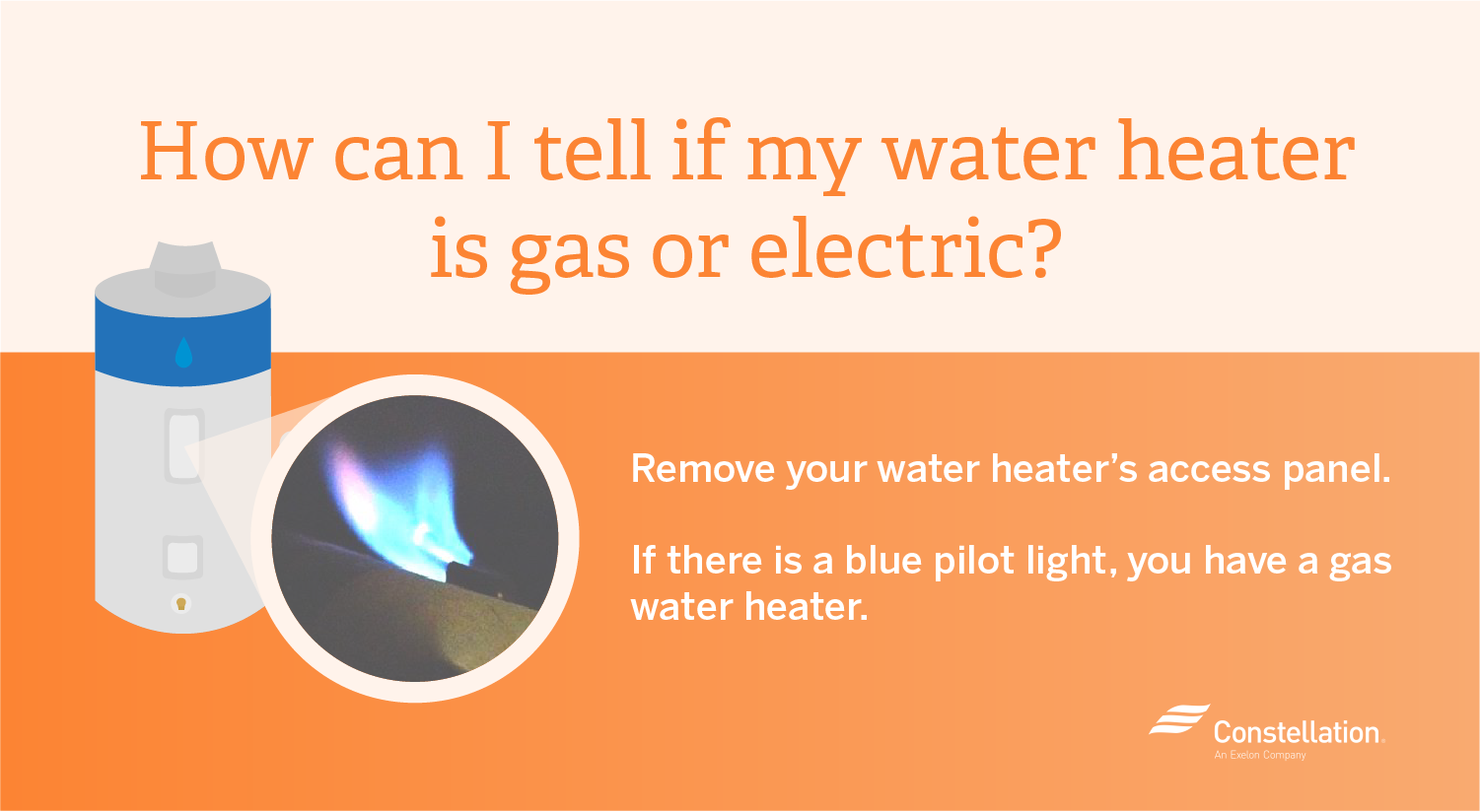
To tell if your water heater is gas or electric, start by removing your water heater’s access panel. If you see a pilot light, or blue flame, behind the access panel, you have a gas water heater. Another difference between gas and electric water heaters is that a gas water heater will have pipes connected to it, whereas an electric heater will have a supply cord.
2. Decide what size water heater you need.
A family of four, for instance, might take several showers, run the dishwasher and wash a few loads of laundry — all in one day. While this might total 100 gallons of water use, that doesn’t mean the water heater needs a 100-gallon capacity. Be as accurate as possible with this estimate. Saving water in the bathroom is helpful — water conservation is always important — but no one wants to be taking a shower when it runs out of hot water. That can happen if sizing a hot-water heater has been done incorrectly for your household.
3. Calculate your desired first-hour rating (FHR).
Consumer Reports advises that when sizing a hot-water heater, you keep in mind the first-hour rating (FHR) for a tank water heater when doing a water heater energy usage comparison. This information indicates how much hot water can be delivered in the first hour. Then, depending on the specific model, you can look at the time the heater requires to return to its full FHR. For example, if your shower energy consumption is high, you might decide to opt for a unit with a higher FHR. Energy.gov provides a formula to help with sizing a water heater for your needs.
4. Pay attention to comparisons between energy-efficient water heaters.
Consumer Reports says that new federal efficiency standards mean that today’s water heaters have improved hot-water heater energy savings, overall. Heaters with fewer than 55 gallons should see about a 4% efficiency boost, thanks to the standards, the consumer organization says. Water heaters larger than 55 gallons, meanwhile, might cut a utility bill by 25%-50%, depending on the technology of the heater.
Energy-efficient water heaters
When doing a water heater energy usage comparison, Energy.gov recommends using the yellow energy guide label found on appliances to identify energy-efficient water heaters. The FHR rating is in the top left corner on water heater labels and is noted as “capacity (first hour rating).” When doing a water heater energy usage comparison, Energy.gov recommends looking for models with FHRs that match within 1 or 2 gallons of your peak hour demand. The peak hour demand is how much hot water your household needs during the hour it uses hot water the most on a daily basis.
Do you currently have an energy-efficient water heater?
That depends on its age. The older your hot-water heater, the more likely you’re losing hot-water heater energy savings. Consumer Reports suggests that if your water heater has a 12-year warranty and you’ve been using it for 15, it’s likely time to look for one of the more energy-efficient options to maximize hot-water heater energy savings. The Department of Energy has changed the regulations on hot-water heaters that make today’s models more likely to offer savings. Additionally, there are many other energy-efficient appliances that can help you cut down on energy usage.
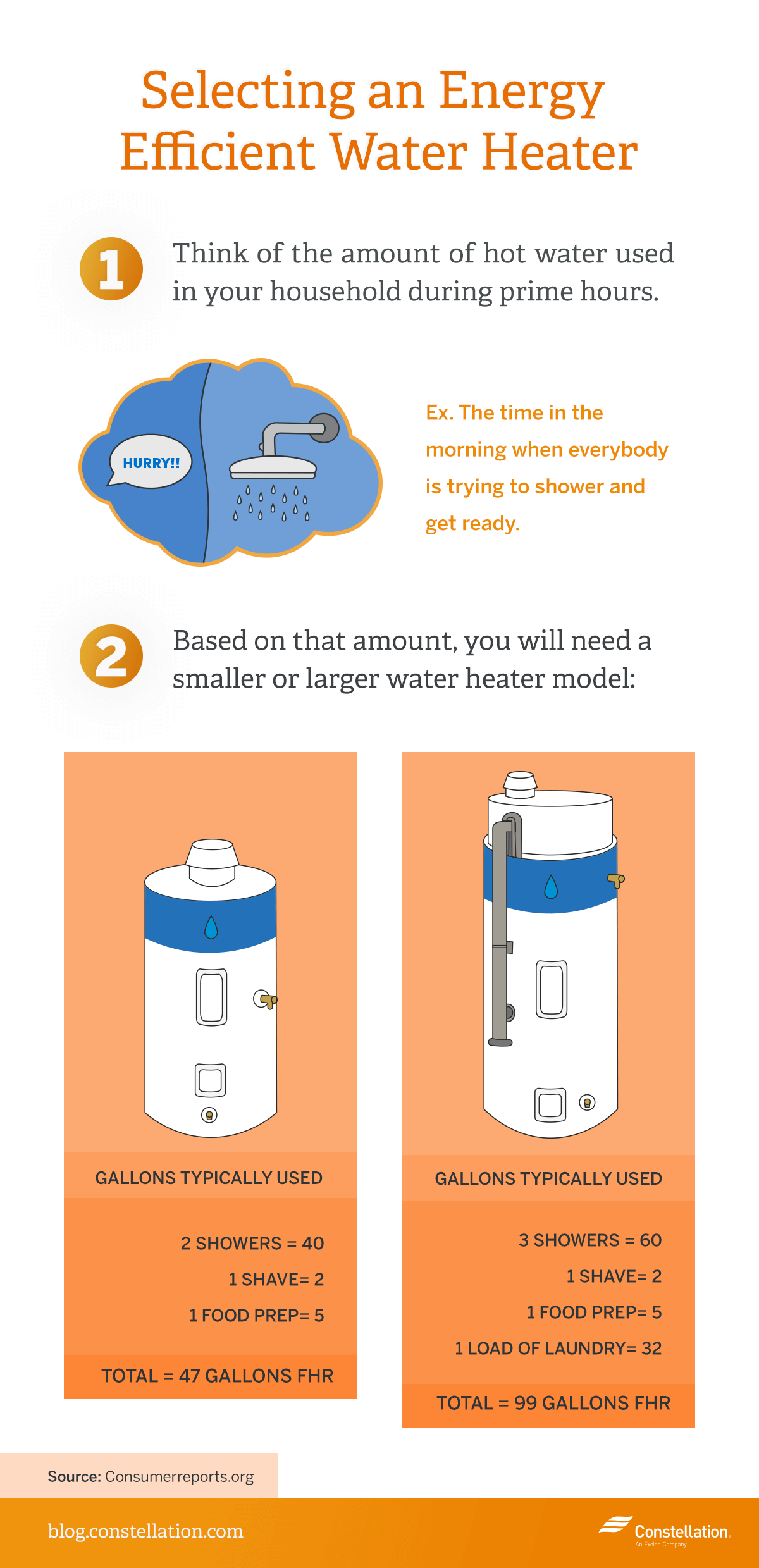
Another consideration when selecting a water heater is the type of energy it uses. While solar and tankless versions can improve home sustainability, water heaters that use natural gas or electricity are still the most common. But are electric water heaters efficient? What about gas units? Let’s take a look at gas vs. electric water heaters to find out.
Gas vs. electric hot-water heater cost and efficiency
For the most part, the choice boils down to understanding gas vs. electric water heater operating costs. Michael Bluejay, aka “Mr. Electricity,” has spent his career analyzing and understanding energy use, including hot-water heater energy savings and the differences between gas vs. electric water heaters.
The difference between gas and electric water heaters
Before selecting a water heater, it’s important to know the differences between gas and electric water heaters. For example, take operating costs. After analyzing gas vs. electric water heater operating costs, Bluejay says that gas is almost always cheaper than electric, assuming that you already have natural gas piped into your home.
Gas water heaters typically cost about $30 a month to run, while electric water heaters run closer to $42 a month, depending on utility rates. But there’s a catch if your home doesn’t already have natural gas. Having to put in a gas line would add expense, and that means it would take much longer to realize any potential hot-water heater energy savings.
To find out what water heater energy use is costing you now, Energy.gov provides a water heater energy cost calculator for both gas and electric units.
Switching from a gas to an electric water heater
According to Bluejay, switching from a gas to an electric water heater could be your best option. He asserts many ways that electric models come out ahead when comparing electric vs. gas water heaters:
- Electric water heaters are less expensive to purchase. Although it ultimately depends on the size, quality and efficiency of your unit, electric water heaters generally have lower upfront costs than gas heaters.
- Electric water heaters are easier to install. Installing a gas water heater involves working with gas lines, which can be both dangerous and expensive.
- Electric water heaters are generally safer. Electric water heaters are not only efficient but also don’t have any fuel that could leak or explode. And they have no combustible byproducts.
- Electric water heaters require less space. Unlike electric heaters, gas water heaters can be dangerous to operate in small spaces that allow gas to build up.
- Electric tank heaters operate more efficiently than gas heaters. Gas heaters lose some of the heat they produce through venting, making them less efficient.
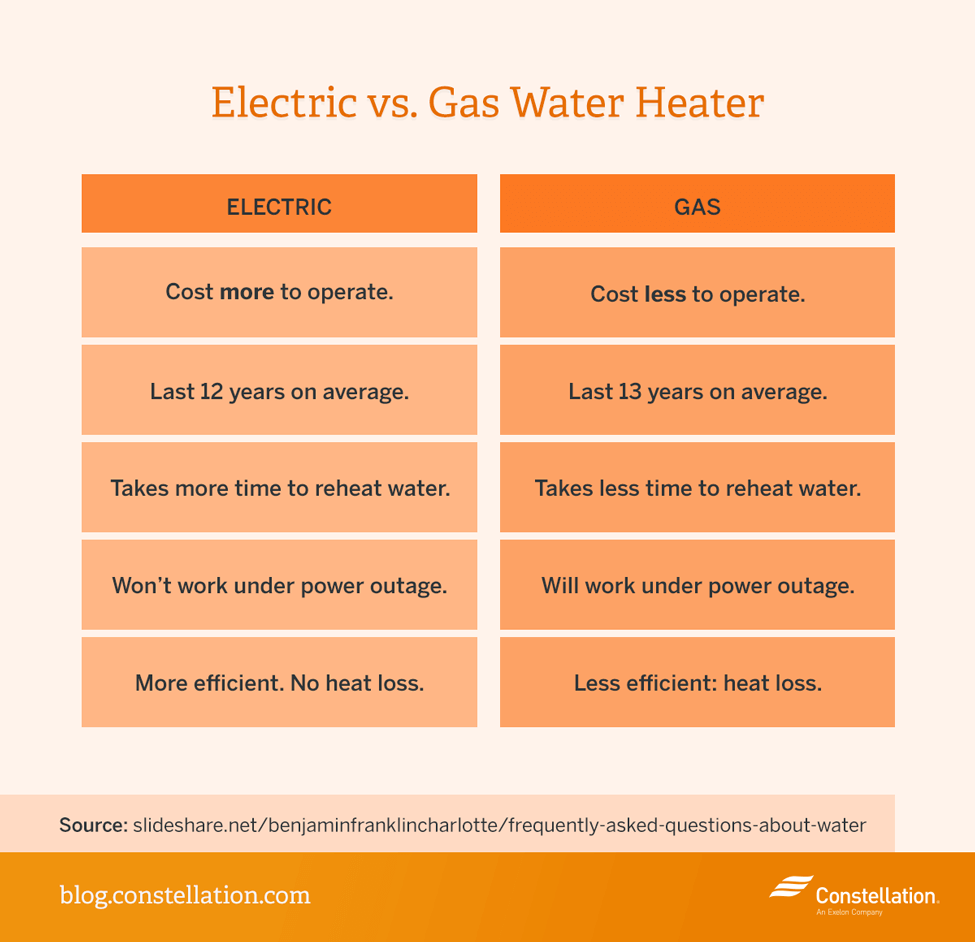
Lower your energy costs with a more energy-efficient water heater
Now you should know how to choose a hot-water heater if replacing your current model with a modern, more energy-efficient water heater makes sense. If your utility bill is higher than you’d like, it’s worth taking a look at your hot-water heater to see if it needs to be replaced. And be sure to read our post that examines tankless vs. traditional water heaters and their energy-saving benefits. After all, when it comes to lowering your energy bill, every little bit can help.

